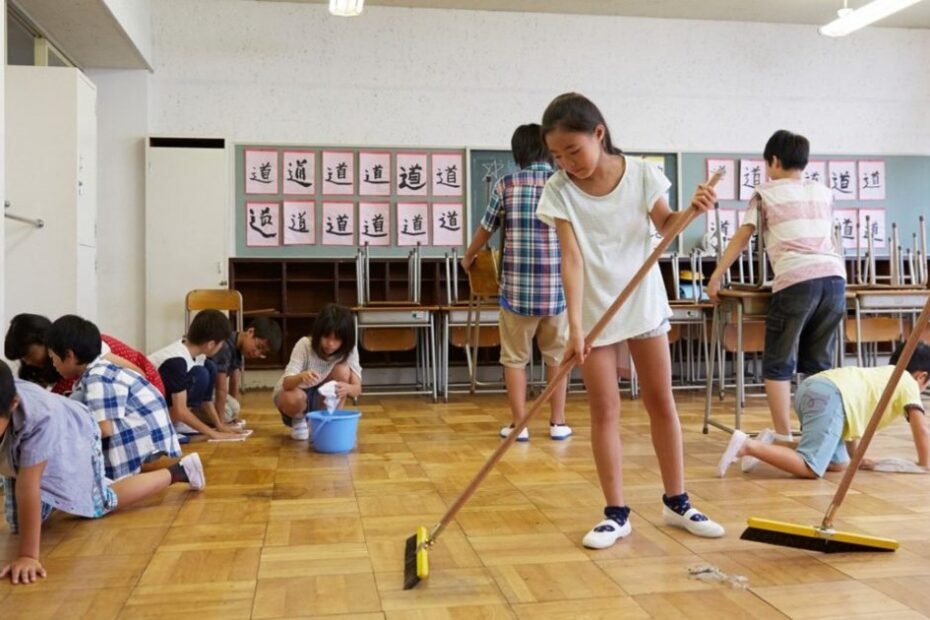Japan, the practice of school cleaning is deeply embedded in the culture, where students are expected to clean their classrooms at the end of each day. This tradition, which dates back centuries, reflects values of discipline, respect, and responsibility among students. However, as educational needs evolve, Japanese schools are also embracing modern innovations to address challenges in cleaning practices and optimize efficiency.

Silent Cleaning: A Unique Tradition Dating Back to the 1970s
One notable aspect of Japan’s school cleaning culture is the concept of silent cleaning, introduced in Nagano Prefecture in the 1970s. The practice involves students cleaning their school buildings in complete silence, aimed at fostering concentration and mindfulness. This tradition not only promotes discipline but also serves as a means to counter rising school violence by calming children’s minds. Students find solace in the quietude, enabling them to focus better on their studies while fulfilling their cleaning duties.
Cultivating Focus and Mindfulness Through Cleaning
Japanese educators emphasize the psychological and spiritual benefits of silent cleaning, aiming to nurture students’ souls and cultivate their minds. By engaging in the meticulous task of cleaning, students develop a sense of responsibility and attention to detail. The practice reflects a holistic approach to education, integrating physical activities with mental discipline, and emotional well-being. Through silent cleaning, students learn the value of mindfulness and the importance of respecting their environment.
Historical Roots in Buddhist Monastic Training
The tradition of school cleaning in Japan has its roots in Buddhist monastic training, where monks were tasked with cleaning temples as part of their spiritual practice. This custom was adopted when schools were established across Japan in the late 19th century, reflecting the influence of Buddhist principles on Japanese education. Today, the ethos of humility, service, and community responsibility continues to shape the culture of school cleaning in Japan.
Innovative Solutions to Modern Challenges
While traditional cleaning practices endure, some Japanese schools are embracing innovation to address contemporary challenges. With declining student numbers and increasing demands on educational resources, schools are exploring efficient cleaning solutions. For instance, a junior high school in Japan introduced robot vacuums to complement manual cleaning efforts. By leveraging technology, schools can optimize cleaning schedules, allowing students to allocate more time to academic and extracurricular activities.
Student-Led Initiatives for Efficiency
In response to the changing landscape of education, student-led initiatives have emerged to enhance cleaning practices in Japanese schools. At the aforementioned junior high school, students proposed the use of robot vacuums to streamline the cleaning process. This collaborative approach empowers students to take ownership of their learning environment while promoting efficiency and resource optimization. Through such initiatives, students develop essential life skills and contribute to the overall well-being of their school community.
Global Influence and Adaptation
Japan’s culture of school cleaning has garnered international attention and has been adopted in other countries, including Egypt. In Egypt, several schools have introduced cleaning practices inspired by Japanese traditions to promote student cooperation and responsibility. The adaptable nature of Japan’s cleaning culture resonates across cultures, reflecting universal values of discipline, respect, and environmental stewardship. As societies navigate educational challenges, the principles of Japanese school cleaning offer valuable insights and inspiration.
Conclusion: Preserving Tradition Amidst Modernization
In conclusion, Japan’s tradition of school cleaning exemplifies a harmonious blend of centuries-old customs and modern innovations. From silent cleaning rituals rooted in Buddhist teachings to the integration of robotic technology, the art of cleaning classrooms continues to thrive in Japanese schools. As the educational landscape evolves, preserving the values of discipline, mindfulness, and community responsibility remains paramount. Through tradition and innovation, Japan’s school cleaning culture reflects a commitment to nurturing the holistic development of students and fostering a sense of pride in their school environment
